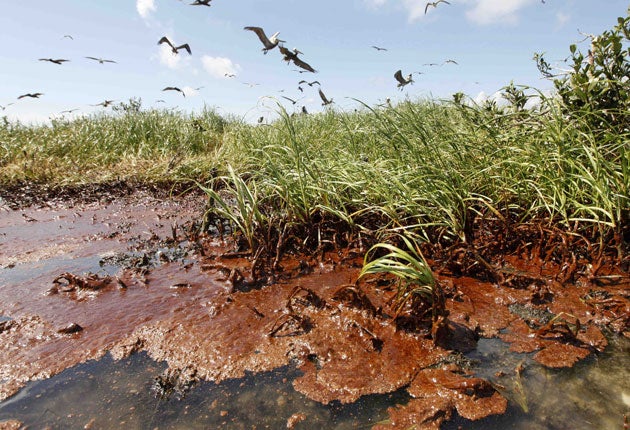The US Government is threatening to remove BP from the operation to halt the Gulf oil spill, and send it the bill at a later date, saying that the job of cleaning up after what will soon become the industry's worst ever environmental disaster has thrown the British firm into an "existential crisis".
Oil continued to pour into the Gulf of Mexico yesterday, as President Obama's Secretary of the Interior, Ken Salazar, told reporters he was "angry and frustrated" at BP's apparent inability to cope with the catastrophe, which began almost five weeks ago, and still has no end in sight.
"We are 33 days into this effort, and deadline after deadline has been missed," he said, after visiting the firm's US offices in Houston. "If we find they're not doing what they're supposed to, we'll push them out of the way. This is an existential crisis for one of the world's largest companies."
Mr Salazar's stern comments came amid growing political pressure on BP, which again admitted that it has underestimated the scale of the leak. According to the company's latest worst-case scenario, it may not be possible to cap the spewing Deepwater Horizon oil well until some time in August.
By then, the compensation bill could run to billions of dollars. The company has already agreed to pay clean-up costs beyond the $75m (£52m) liability limit set by US law, and also pledged to honour all "legitimate" claims from the tourism and fishing industries.
Mr Salazar is heading back to Louisiana to monitor the crisis today. Among the questions he may hope to see answered is why BP continues to use a highly toxic dispersant, Corexit 9500, to help break up the oil slick.
On Thursday, the Environmental Protection Agency (EPA) gave the firm 72 hours to stop using the controversial product. But BP refused, and was still using it yesterday. So far, 715,000 gallons have been pumped on to the slick.
BP, whose shares have dropped from £6.50 to £5.17 since the disaster began, is now blocking the EPA from publishing the reasons it has given for refusing to stop using Corexit, citing commercial confidentiality. The agency is therefore "evaluating all legal options".
Company executives may soon have to worry about the prospect of criminal charges. The White House says Justice Department officials are also in the region following President Obama's announcement on Saturday of a formal inquiry, which he said could lead to possible prosecutions.
Critics have repeatedly accused BP of trying to keep the public in the dark about the full scale of the disaster, and the steps it took to minimise risk. When the spill first occurred, on 20 April, the firm said only 1,000 barrels a day of oil were leaking into the Gulf. However, it was later forced to revise that figure upwards to 5,000.
The firm was also reluctant to allow the public to see underwater videos of the gushing well. When it eventually relented to political pressure to stream live footage on its website, its server crashed, prompting a Democratic member of the House of Representatives to comment that BP had "lost all credibility".
Asked about the comment, BP's managing director, Robert Dudley, admitted yesterday that "those words hurt a little bit", saying his company had been "very open" about what it was doing to clear up the mess.
"In terms of not trusting BP, there's nobody who is more devastated by what has happened, and nobody that wants to shut this off more than we do, and learn what happened, so this never happens anywhere, to anyone anywhere in the world again," he told CNN.
By official estimates, 6 million gallons of oil have now spilled, leaving it some way short of the 11 million which hit Alaska during the Exxon Valdez crisis. But the total is rising fast.
A mile-long relief tube that is supposed to be slowing the spill captured roughly 57,000 gallons of oil in the past 24 hours, a sharp drop from the 92,000 gallons of the previous day.
An effort to cap the ruptured pipe 5,000ft beneath the sea with a mixture of heavy soil and cement, which was originally due to begin last night, has been delayed until Tuesday. If that doesn't work, the firm will try to execute a "junk shot", in which it will try to plug the hole with old car tyres, golf balls and human hair.
Obama's tough talk
*2 May: President Obama: "Let me be clear: BP is responsible for this leak; BP will be paying the bill"
*3 May: White House spokesman Robert Gibbs promised the adminstration would keep its "boot on the throat" of BP to make sure it paid all costs. "If local fishermen can't fish, that's an economic loss that BP is going to have to pay for."
*14 May: Obama on the "ridiculous spectacle" of oil chiefs at a congressional hearing: "You had executives of BP and Transocean and Halliburton falling over each other to point the finger of blame at somebody else. The American people cannot have been impressed with that, and I certainly wasn't. I will not tolerate more finger-pointing or irresponsibility.
*16 May: Senior administration officials write to BP, saying: "We will not rest until BP permanently seals the wellhead, the spill is cleaned up, and the communities and natural resources of the Gulf Coast are restored and made whole."
*22 May: President Obama: "First and foremost, what led to this disaster was a breakdown of responsibility on the part of BP and perhaps others, including Transocean and Halliburton."

Join our commenting forum
Join thought-provoking conversations, follow other Independent readers and see their replies
Comments